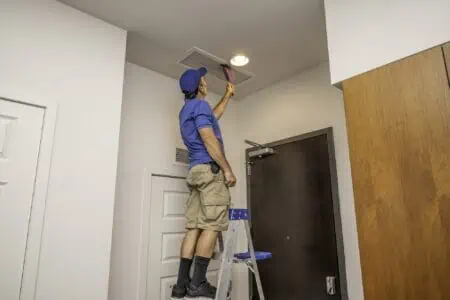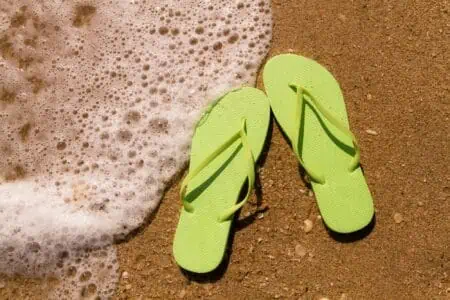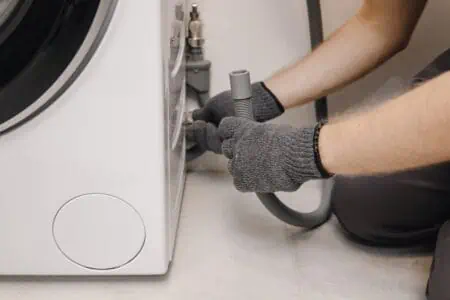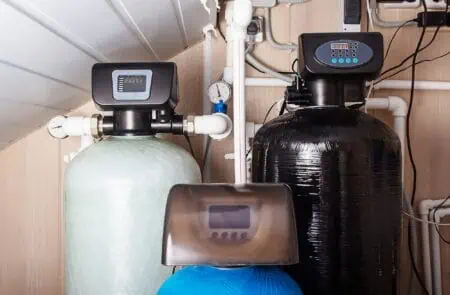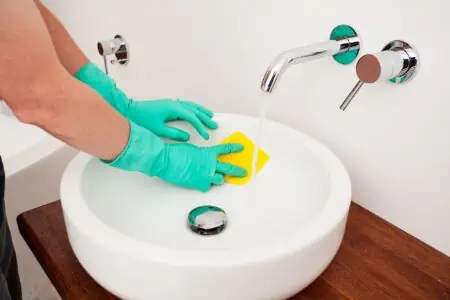When odors leach out from your air ducts, they spread throughout your entire home. This is extremely off-putting for you, your family, and your guests.
We’ll show you how to remove odors from air ducts so your home can smell fresh and clean once again.
Our methods explain how to identify the smell, when to call a professional, and how to complete the task yourself. Consider this your ultimate guide to air duct maintenance.
Key Takeaways
- Remove vent covers and clean them with soapy water; wipe air ducts and vacuum excess dust.
- Attach dryer sheets or use essential oils to freshen up the air vents.
- Clean the evaporator coils and replace the air filter in the HVAC system if odors persist.
- Hire a professional for complex issues like sewage, rotting, or burning smells.
What Causes Bad Smells in Air Ducts?
It can be complex to figure out the source of air duct odors. Various issues can cause these problems. This can include animals in the ducts, leaks, plumbing issues, building materials, or even mold and mildew.
We’ll walk through the main types of smells and what might be causing them.
Sewage Smell
If you can smell sewage, it could be due to a broken pipe or a backed-up sewer line. You will need to get the plumbing issue repaired and deep clean the air ducts.
Musty or Stale Smell
A stale or musty smell — that can sometimes smell like stinky feet — is usually caused by mold or mildew. In this case, you will need to deep clean the ducts and the evaporator coils. We recommend hiring a professional to ensure all mold and mildew traces are gone.
If mold or mildew spores are spread through your home and into the air, it can adversely affect your health. This is especially urgent if somebody in your home has allergies or asthma.
Rotting Smell
A rancid or rotting smell is unfortunately caused by a dead animal somewhere in the ductwork. You will need to hire an exterminator as well as deep clean the ducts.
Burning Gas Smell
If you notice a burning gas smell when you turn on your heater, this can often be blamed on dust getting burned off the heat exchanger. If it disappears after a few minutes, this isn’t a cause for concern.
However, if the fumes continue, turn the heater off, leave the house and contact a heating, ventilation, and air conditioning (HVAC) technician for help.
Rotten Egg Smell
A rotten egg smell is caused by a natural gas that has leaked from somewhere nearby into your home. This is a hazardous situation — open the windows and leave the house immediately. Call your gas company so they can turn off the gas supply and repair the leak.
If the leak is coming from the ducts or HVAC system, a technician will need to repair it.
Oily Smell
An oil leak in the HVAC system usually causes an oily smell. This could be due to a problem with the system’s oil burner. You should contact an HVAC technician.
Overheating or Electrical Smell
If you smell this odor from the air conditioner, turn the system off immediately and check if the air filter is clogged. If so, this can lead to overheating and poor airflow.
However, if the filter isn’t clogged, then this could be a wiring issue. Contact a qualified HVAC technician to repair the problem.
If you notice smoke or fire, leave the house immediately and call emergency services.
Bottom Line
If you have smelly air ducts, make sure it’s not a serious problem like a gas leak or poor wiring. Once you have determined the HVAC system is safe, and it’s just general odors, you can clean the air ducts yourself.
How To Remove Odor From Air Ducts
There are four ways to issue odor treatment to your air ducts. We’ll walk you through each one with step-by-step instructions. Before starting, turn off the HVAC system at the thermostat or circuit breaker.
Clean Air Ducts
Learning how to deodorize air ducts can be as simple as learning how to clean them. Here’s how to clean air ducts:
- Turn if off: Ensure you have turned your HVAC system off at the circuit.
- Remove and wash vent covers: Use a screwdriver to remove your vent covers. Many can be washed in the dishwasher, or you can wash them with hot soapy water. Rinse them well and leave them to air dry.
- Cover the vents: Cover all the open air vents with a piece of cardboard to prevent dust from flying out of every vent.
- Wipe the air ducts: Use a damp microfiber cloth to remove dust from one air vent at a time.
- Vacuum the dust: Use a vacuum with a nozzle to suck out all dirt and dust from the air ducts. We recommend a shop vac as it can handle dust better than a household vacuum. Repeat steps three and four for every air duct in the home, ensuring to cover the other ones with cardboard to prevent dust flow.
- Replace vent covers: After cleaning the ducts, replace the covers and turn your HVAC system back on.
For a more thorough cleaning of air ducts, refer to our “How to Clean Air Ducts” section, where we will also discuss cleaning evaporator coils and replacing the filter.
Air Duct Odor Eliminators
There are some things you can put in your air ducts to make your home smell good, especially after duct cleaning.
First of all, you can attach dryer sheets to the vents. This will neutralize odors and fill each room with a subtle but fresh scent.
If you prefer the power of essential oils, apply a few drops to sheets of paper towel. Attach these to the vents. When you turn on your heating or air conditioning, this will fill the room with your chosen scent.
You can also use sachet bags. Simply place them in the heating vents, and they will fill your home with a nice perfume when you use the HVAC system.
Another idea is to place a bowl of baking soda inside the air ducts. This natural deodorizer is great for horizontal air ducts and will absorb bad odors. Just make sure to swap it out for fresh baking soda every couple of days.
Install Duct Filter Pads
Another option to try is installing duct filter pads. These work to eliminate odors within the duct system.
All you need to do is unscrew the vent covers and install the filter pad into the grate. Screw the filter back in place and let the pad absorb any offensive odors.
Install Home Air Purifier
Finally, a home air purifier will work wonders at removing bad odors, bacteria, germs, and other nasties. When these particles go through your HVAC system and into the room, the air purifier will work to remove them. Not only does this leave you with an odor-free home, but it can minimize your chances of getting unwell.
Signs Your Air Ducts Need Cleaning
If you’re not sure whether your air ducts need cleaning, here are some signs you shouldn’t ignore:
- Dust: If you see visible dust in or around the ducts, clean your air ducts. You might also notice that your home is particularly dusty — this can be due to excess dust flowing through the ducts.
- Mold: If you can see or smell mold, promptly clean your air ducts.
- Allergies: Your allergies may be worse due to the particles that are blown through your air ducts into your home.
- High energy bills: When your HVAC system is dirty, it has to work harder. This consumes more energy, thus increasing your household energy bills.
- Rodents: If you can see, hear or smell animals within your ducts, you need to hire pest control and deep clean your ducts once the animals have been removed.
- Construction: If your home has undergone reconstruction or remodeling, there will no doubt be dust and debris in the air ducts.
- Clogs: If the vents, ducts, or air filters are clogged, it’s time to clean the air ducts and replace the filter.
- Bad smells: You know by now that if you smell something bad — it’s time to clean the ducts.
- Poor airflow: If you notice poor airflow, give your ducts a clean. This can often solve the problem.
- Weird noises: You might hear strange or unfamiliar noises within the HVAC system. Your HVAC system should be relatively noiseless when it’s working correctly.
- Your health is poor: If you wake up every day with dryness, a sore throat, or cold symptoms, it could be due to your home’s HVAC system.
If you don’t have any problems from above, then you don’t need to clean your air ducts. The EPA suggests only cleaning your air ducts when necessary (1). While you can clean your ducts every three to five years if you wish, it’s important to note that if done improperly, this can cause indoor air problems.
How To Clean Air Ducts
It’s vital that you clean your air ducts when there is an issue within the HVAC system. Following proper instructions is crucial, as you could face further issues if you don’t clean the ducts properly. When in doubt, hire a professional.
On that note, we will show you the best methods for cleaning air ducts as recommended by experts. We’ll break it down into four parts: the vent covers, the evaporator coils, the condensate drain line, and the air filter.
- Time: 1 hour.
- Difficulty: Intermediate.
What You’ll Need
- Screwdriver.
- Dish soap.
- Water.
- Sink.
- Scrubbing brush.
- Towels.
- Handheld wire brush.
- Wet/dry shop vac.
- Cloths.
- Coil cleaner.
- Hose (optional).
- New HVAC system filter.
Clean Vent Covers
- Unscrew: Unscrew the AC vent covers.
- Wash: Depending on the brand and material, you can pop these in the dishwasher. However, it’s easy to wash them by hand. Fill a sink with hot, soapy water and scrub them with a brush.
- Rinse: Rinse the vent covers well.
- Dry: Dry with a towel or leave the covers to air dry.
- Return: Once the vent covers are clean and dry, return them to the vents.
Clean the Evaporator Coil
- Turn off the system: Turn off your HVAC system at the thermostat.
- Remove cover: Remove the air intake grill cover and filter. Then remove the top and bottom cover on the air conditioner unit so you can access the coils.
- Brush: Use a handheld wire brush to clean the coils. Move-in horizontal strokes to dislodge the dust and debris on the coils.
- Vacuum: Use a shop vacuum to vacuum the loosened residue from the coils. If you don’t have a shop vac, you can hire one, borrow one or purchase your own. We recommend the Stanley Wet/Dry Vacuum.
- Wipe: Wipe the coils and the bottom of the drain pan with a wet rag.
- Apply coil cleaner: Next, you’ll use a coil cleaner to deep clean any residue. Follow the manufacturer’s instructions for the application method. In general, you simply spray a thick layer of cleaner onto the coils. You may want to put towels on the drain pan or floor to catch the excess.
- Rinse the coils: If necessary (as some coil cleaners are no-rinse), rinse the coils. Some people use their hose for this, but you can simply use a wet cloth.
- Brush: Brush the coils again to remove the loosened debris.
- Vacuum: Vacuum the coils to collect excess debris, dust, and dirt.
Unclog Condensate Drain Line
The drain line can become clogged, which can lead to mold growth and, therefore, odors. If you have a clogged condensate drain line, here’s how to unclog it and freshen up your home:
- Prepare your shop vac: Make sure you use a wet/dry vac for this job. You should remove the paper cloth filter, so it doesn’t get ruined. Hold the vacuum hose against the end of the pipe and wrap a cloth around it, holding tight to ensure no air gaps.
- Turn on the vac: Turn the shop vac on for about five seconds to suck the clog out. Repeat if necessary.
Replace Air Filter
Part of knowing how to get rid of smells from air ducts includes changing out the air filter every two to three months. Here’s how:
- Turn off your HVAC system: Don’t forget about this step. It makes it much easier to replace the filter.
- Locate and expose the filter: Remove the door so you can access the filter. It’s usually located between the return plenum (the large, usually silver box that receives used air and puts it back into the HVAC system) and the main HVAC unit. Sometimes it is behind one of the air returns in your home.
- Remove old filter: Remove the existing filter, noting which direction the airflow arrow goes.
- Insert new filter: Simply slot the new filter where the old one was. Make sure the arrow is pointing in the direction of the airflow. To help you out here, the arrow should be pointing toward the blower or furnace.
When to Hire a Professional
It’s a good idea to hire a professional if you aren’t sure if your air ducts even need cleaning. They will answer any questions you have, examine the ducts and talk you through their services.
You should also hire a professional if you have bizarre smells, like sewage, rotting, or burning. Finally, we recommend hiring a professional if you aren’t confident in carrying out the steps yourself.
When hiring, the EPA recommends contacting the National Air Duct Cleaners Association (NADCA). They say to speak to three service providers to get advice and quotes before deciding what to do.
When they come to investigate, ask them to show you the contamination that would justify getting your ducts cleaned. You should also ensure they don’t use chemical biocides or chemical treatments during the cleaning process.
Once you’ve found a provider you are happy with, they will carry out their process by opening access ports and doors to deep clean the entire system. They will inspect that the system is free of asbestos. If so, they will vacuum out particles using a HEPA vacuum.
They will brush the ducts to remove dust and debris. Meanwhile, they will protect your flooring and furniture to prevent in-house damage. They will protect the ducts, sealing, and insulation during the process. If anything gets damaged, they should repair it.
FAQs
Saying Farewell To Odors
An HVAC system is a blessing in many ways, but it requires maintenance. You probably feel pretty disheartened when you notice an odor in your air vents. Nobody wants mildew smells and other odors floating through their home.
Thankfully, our tips can help with how to stop smells from coming through vents and remove the source of the odor. When in doubt or when dealing with more severe odors, contact a professional.
After cleaning, make sure to regularly swap out your filters and take note of any other problems within the HVAC system. You don’t need to clean the air ducts routinely, but you should clean them whenever you notice an issue.
